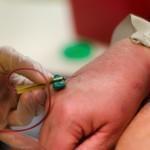
Phlebotomists play a crucial role in the healthcare industry. They’re the people applying the tourniquet, disinfecting the needle’s access point, and finally, sticking the needle in your vein. However, phlebotomists’ people skills are often overlooked. Since so many of us get scared, dizzy, or even faint at the thought or sight of a needle entering our flesh, phlebotomists have to do quite a bit of charming in order to keep the donor or patient strong. Phlebotomists also must possess a steady hand and focused eye—if the patient or donor was squeamish the first time about getting a needle in their arm, you can imagine how they’ll feel if you miss the vein and have to re-stick them.
Below, we’ll highlight four places you can use your Phlebotomist certification.
Hospitals
Not a huge surprise seeing as phlebotomists work strictly with blood, however you’d be surprised how many phlebotomists work in a hospital. A steady flow of inbound patients guarantees a never-ending queue of blood samples and tests. If you’ve ever been admitted to a hospital and had blood drawn, you’ll probably remember it wasn’t the nurse or doctor drawing it — it was the magical phlebotomist.
Clinics
As our Baby Boomer population gets older, the need for affordable health clinics grows by the day. These clinics are typically staffed with Medical Doctors, RNs, Care Managers, Nurse Practitioners, Physician Assistants, Medical Assistants, and you guessed it—Phlebotomists. In a clinical setting, Phlebotomists not only draw and collect blood from patients, but may also be involved on the laboratory side, performing diagnostic testing and other lab processes.
Physician Offices
As with hospitals—doctors and nurses—while qualified, usually aren’t the ones drawing the blood themselves. Physician offices, while a lot lighter on patient traffic than a hospital, still needs to take blood swabs and samples for testing. This opens the door for more phlebotomy jobs all over the nation.
Blood Donation Centers
Blood donation centers are everywhere. These organizations also travel around the local community from time to time to boost awareness and their donor list. Chances are the American Red Cross has visited a school, office building or community center you’ve been at in the past. Phlebotomists fuel these organizations and help blood get to people who need it all over the country. In addition to organizations like the Red Cross, plasma centers have popped up at an increasing rate, which are almost fully staffed with phlebotomists.
The field of Phlebotomy is ripe with growth and opportunity. Fill out the Request Information form today to begin an exciting and rewarding career as a Phlebotomist!
Information in this blog post is accurate as of August 21, 2015.
